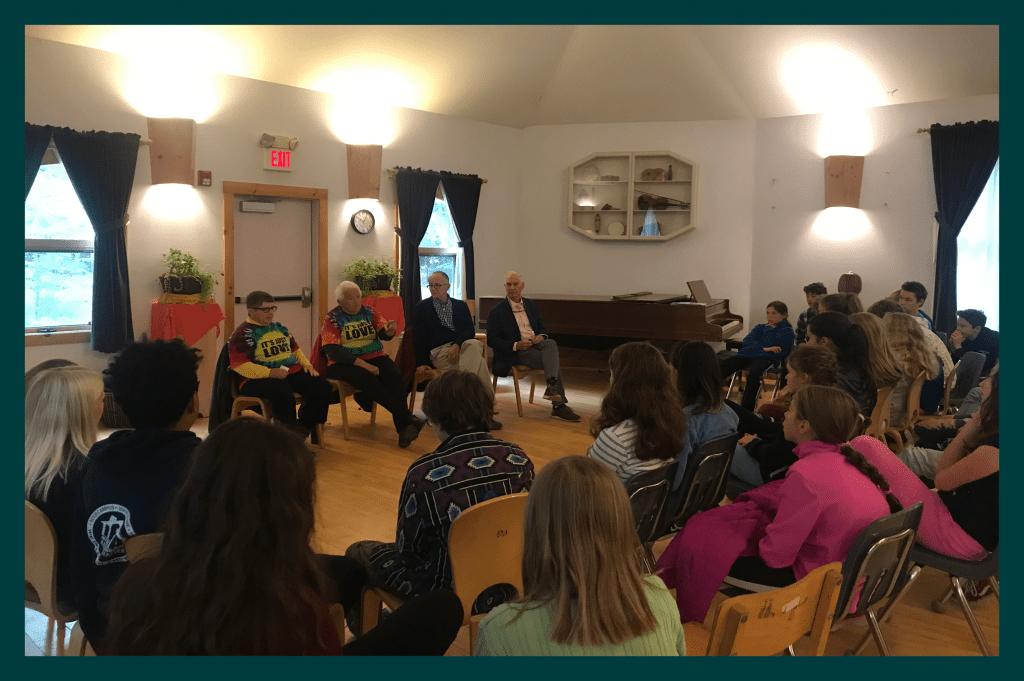
On December 20, 1999, the Vermont Supreme Court ruled in Baker v. Vermont that gay and lesbian couples were entitled to the same legal rights and benefits of marriage as heterosexual couples. The decision, wrote Chief Justice Jeffrey Amestoy, “is simply a recognition of our common humanity.”
On April 25, 2000, after a four-month marathon of public hearings, counter-demonstrations, and statewide soul-searching, the Vermont House of Representatives voted 79 to 68 to pass the civil unions bill, the first of its kind in the nation.
On October 28, 2019, four people at the center of that historic moment came together at LCWS to remember that era and reflect on the journey toward marriage equality. Stan Baker, Peter Harrigan, Holly Puterbaugh and Lois Farnham were all asked to be “test cases” in Vermont, along with another couple, Nina Beck and Stacey Jolles. Each couple went to their local town clerk to ask for a marriage license, were formally denied, and then sued the state for the right to marry. With dedicated lawyers Susan Murray and Beth Robinson from Burlington, and Bill Lippert, Hinesburg legislator and the first openly gay lawmaker in Vermont, they worked to bring their case first to the Vermont Supreme Court, then to hearings in the Vermont House.
Many of the memories these activists shared were a testament to what is special about Vermont: the couples, who lived in Milton and Shelburne, knew their town clerks and said town officials were “rooting” for them. They had personal relationships with their lawmakers and with the governor because in Vermont, that was easy to do. None lost their jobs, all were supported by their faith communities, and in general, they felt physically safe and emotionally supported.
But taking up the battle was still an act of courage. Each spoke about what it was like to come out as gay or lesbian in a time when “there were no role models” and when “I didn’t even have any positive language for who I was.” They spoke about terrible stereotypes and bullying they experienced growing up. After the lawsuit, there were consequences: one of the group was a teacher who had parents pull their children out of her class, another was a child psychotherapist who lost clients. They remember backlash against marriage equality outside of Chittenden County. Driving through the Northeast Kingdom, they saw barns posted with the sign “Take Vermont Back”–a slogan for the anti-gay marriage movement in Vermont. One couple was featured on a website against gay people that listed them as targets for protest and potential violence.
But they persevered. Today, they note, all three of the couples are still married, still living in Vermont. One of the panel said, “I think that may speak to what it was like here. In Massachusetts, in other states that were at the forefront of marriage equality, many of those original couples separated. I think the pressure was greater on them, and it was harder for them than it was for us here.”
This panel was part of Unbound: Arts and Activism, a program that brings social justice and anti-bias curriculum to our middle school students. Each month students in grades 6-8 spend two or three days studying a social justice topic in-depth. They meet with community activists, hear inspiring biographies, read articles about contemporary issues, engage in hands-on activities, and make art that reflects the themes they’ve studied. They also take meaningful action. After this block, students decided with faculty support to start a middle school Gender and Sexuality Alliance (GSA) club with a faculty sponsor. The group will meet weekly to build community, create safe space for young adolescents to explore questions of identity, educate the school community about LGBTQIA issues, and organize to bring positive social change to the school and larger community. Look for more to come from this newest addition to our school!
– Abigail Diehl-Noble

